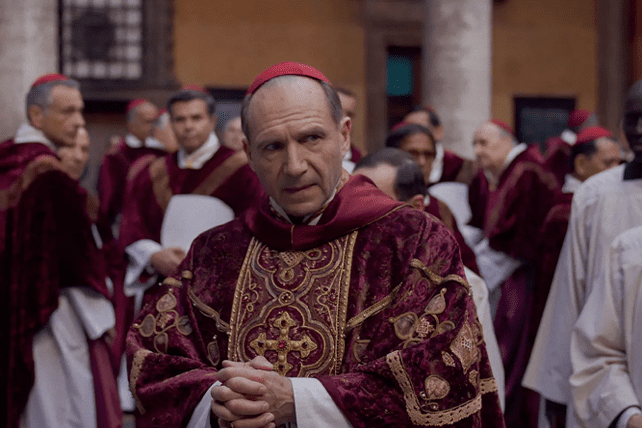This article contains spoilers for the film.
(RNS) — Despite constant buzz about Pope Francis’ age and health, the only conclave — the gathering of the Catholic Church’s College of Cardinals to elect a new pontiff — on the horizon is in theaters: A cinematic flocking of red-hatted, red-robed princes of the church portrayed in a star-studded thriller in theaters Oct. 25.
“Conclave,” Robert Harris’ 2016 novel, dramatizes the Catholic process for choosing a new supreme leader in a film that has already won top prizes at multiple film festivals and seems well positioned for awards show season.
Despite the barrage of the improbable, telenovela-worthy plot twists, the film’s tone is serious, with artistic shots of the cardinals and the Vatican and a string-heavy score backing theological discussions about doubt and power.
Director Edward Berger, who comes to “Conclave” after winning an Oscar for 2022’s “All Quiet on the Western Front,” told RNS he was drawn to the world of Harris’ novel both because of its “theatricality,” as well as the avenue it takes to explore what happens in an “institution where a top job is empty.”
While Berger was raised Protestant, he remembers visiting a friend’s Catholic church and being curious “because I thought it was so much more interesting than my service where I went, because of the theatricality, in a way, and all the rituals.”
But he also remembers being a little frightened by those rituals. The director explained, “They intimidated me because I always thought I would do something wrong.”
Ralph Fiennes, who stars as Cardinal Lawrence, the dean of the College of Cardinals, said the “human questions” are what he loves about the film.
“The church is peopled by human beings, and it’s interesting to reflect on their motivation,” said Fiennes, best known most recently for a lead role in “The Menu” and for playing the arch-villain Lord Voldemort in the Harry Potter movies.
“I thought this script did not seek to satirize or somehow cynically exploit the Catholic church,” he told RNS. “I thought it was a very human look at a particular aspect of the Catholic Church, which is huge and complex.”
He also explained that those making the film had done their best to be “accurate to the details of ritual” with a religious adviser on set. “I hope at a physical, practical level, it’s accurate. I’m sure there’ll be people to tell us where we did things wrong, but that was the aspiration anyway,” he said.
Fiennes, who was raised Catholic but now describes himself as “lapsed,” said he still has “a very keen interest in what it is to have a spiritual guide or sense of a path” and described the Catholic church as “an object of great interest” to him.

